Trigger Warning: This article mentions gender-based violence.
The death of Shraddha Walkar, a 27-year-old woman, in the national capital has brought intense and deep conversations into the public domain. The discourse over her death is accelerated with victim blaming and accusations over her interfaith relationship with Aftab Ameen Poonawala, who has been arrested and charged with the murder. The news of her death sparked the Indian mainstream media giving clickbait headlines questioning Shraddha’s life choices.
With the sensational news coming from the police that Aftab chopped his partner into 35 pieces and stored the body parts in a fridge, the investigation started when Sharddha Walkar’s friend Laxman Nidar informed her brother that she is not available on the phone for months. “I was worried about Shraddha since July as there wasn’t any reply from her side. Her phone was switched off too. After enquiring about her among her other friends,I informed her brother and we approached the police,” says Laxman Nadir to ANI.
“This is clearly a case of a violent crime by an intimate partner.The Right Wing is as usual trying to capitalise on this gruesome tragedy to invoke the bogey of so-called Love Jihad. It is a desperate attempt to divide Indians and to spread hatred against a community rather than have sympathy for the woman’s safety and security. This tendency to politicise every issue in a Hindu-Muslim binary distracts attention from women’s rights violations so rampant in our country. They must desist from this dangerous politics and support the cause of justice and equality for women.”
Zakia Soman, Founder member of Bharatiya Muslim Mahila Andolan
Aftab and Shraddha met on Bumble while they were working in Mumbai. This case has also put serious suspicion over the safety of dating applications.“Yes, I killed her,” the 28-year-old Aftab Ameen Poonawala said to the police.
With this incident happening in India, the mainstream media has been reporting this gruesome murder case insensitively, garnishing headlines with heaps of victim blaming and catering to religious tensions. While this is a murder case that has sent shocking waves across India and the readers are quite anxious to know the updates, there has been a very less sensitive approach in covering the issue with ethics.
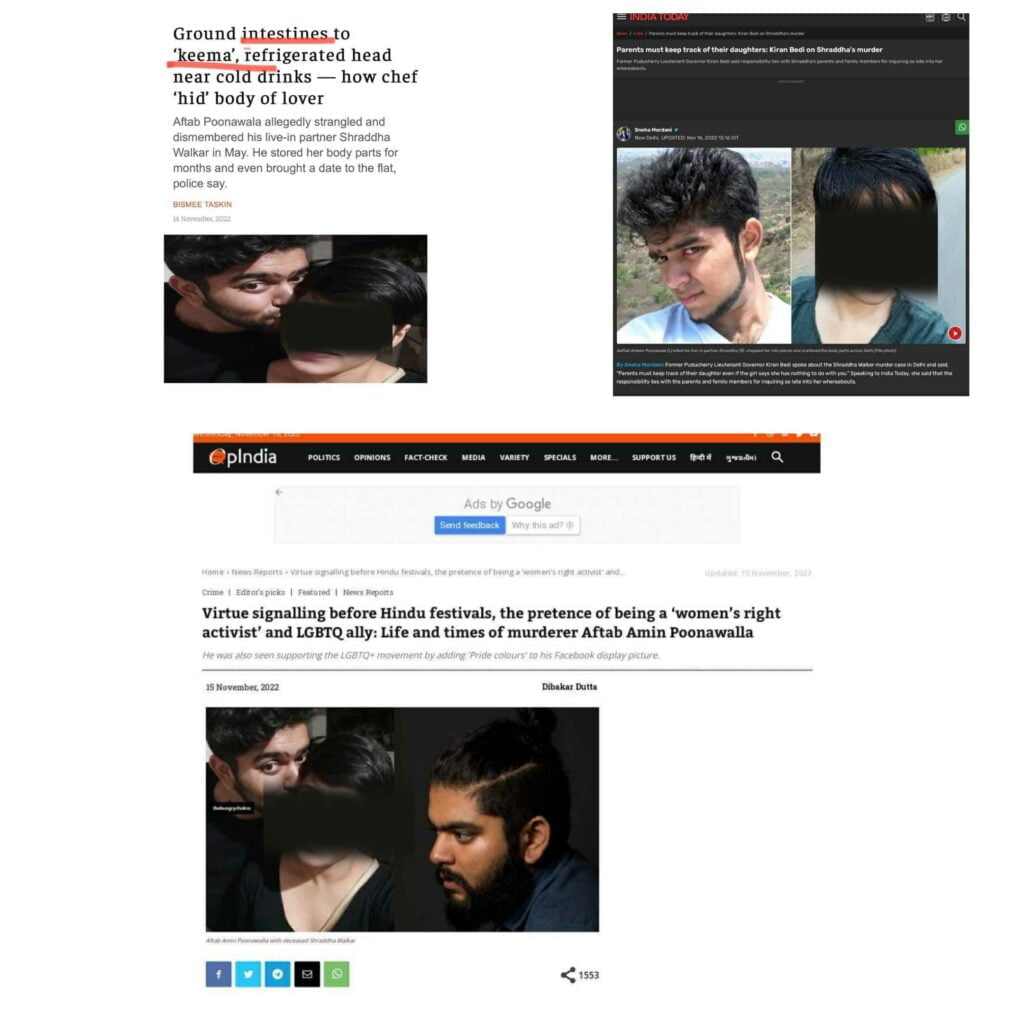
Islamophobia, Love Jihad and women
With Shraddha’s father’s “suspect ‘Love Jihad’, want the death penalty for Aftab” statement, Love Jihad is again making its way to the headlines with appropriations from right-wing groups, initiating a mass movement and trending hashtags in social media. The name Aftab Ameen has become a weapon for right-wing propagandists to suddenly protest and seek justice for the victim.
Also read: Not Jihad, It’s Love Actually
The women’s rights activist from India and one of the founding members of Bharatiya Muslim Mahila Andolan, Zakia Soman in a conversation with Feminism in India says that the details are ghastly and we need justice for Shraddha. “This is clearly a case of a violent crime by an intimate partner. The Right Wing is as usual trying to capitalise on this gruesome tragedy to invoke the bogey of so-called Love Jihad. It is a desperate attempt to divide Indians and to spread hatred against a community rather than have sympathy for the woman’s safety and security. This tendency to politicise every issue in a Hindu-Muslim binary distracts attention from women’s rights violations so rampant in our country. They must desist from this dangerous politics and support the cause of justice and equality for women,” Zakia adds.
At a time when the state is targeting its minorities, this murder case has lit up Islamophobia in the country. The intensity of this issue and how it is to be analysed is of utmost relevance when it comes to gender-based violence and abuse. For the past few days, this has not been happening and there still remains conversations and discussions on how being a sanskari woman in India helps you to escape the toxic relationship, rape and violence.
There have been no protests, hashtags or movements in the case of Abhijit Patidar who claimed to have killed Shilpa Jharia, by slitting her throat and came up with a video saying ‘Don’t be unfaithful’. Similar is the case with Priti Sharma, a 35-year-old woman from Ghaziabad, who slit the throat of her live-in partner, Mohammed Firoz (22), in the month of August 2022. Media as well as the public are very less keen on these, especially when it comes to violence, domestic abuse and rape unless and until there is no scope for creating religious tension. This has become common in India where there is a normalisation of structural violence. What makes Aftab’s case more terrifying is his cruel and ghastly actions on a woman’s body. His inspiration to commit this crime was influenced by a TV show called Dexter is equally alarming to the public.
Is caste accountable for this murder?
The caste identity of the victim cannot be unseen as it’s quite common in India where women are disowned and cut off from the family once they choose inter-faith or inter-caste relationships. This has some serious dimensions since women often feel left out of their own house and find it difficult to cope with the abuses and violence they have to undergo in a relationship. “We opposed this decision because we were Hindu and Koli by caste while the boy is Muslim and interfaith relationships were not allowed in our religion,” Vikas Walkar said in the FIR.
“’Marry the man your parents choose for you’ is the wrong conclusion to draw from Shraddha’s murder- after all, women are just as likely to be beaten or killed by husbands as by live-in partners. Moreover dowry killings happen most to women in arranged marriages. The Delhi HC observed that in 9 out of 10 cases in which the murder victim is a woman, the killer is the husband, the victim the wife, the place the home.”
Kavita Krishnan, Women’s rights activist
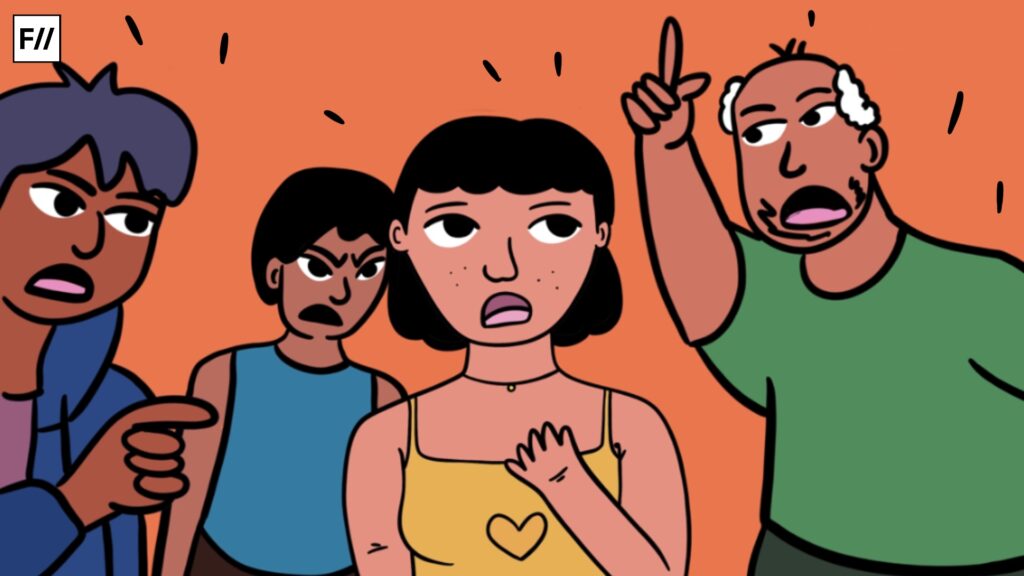
Caste has enabled this horrifying murder as women are often ostracised when they choose a partner from another community. Caste has contributed its part in this murder as women often feel it as their problem, being ashamed to confirm and convey to the family that their partner is abusive and having no support to fight the abuser. This is also one of the reasons why there are a larger number of deaths due to domestic and sexual abuse.
Also read: How Continuous Caste-Based ‘Honour’ Killings In India Prove That Mere Love Is Not Enough
Kavita Krishnan, the women’s rights activist and the former politburo member of the Communist Party of India Liberation, is of the opinion that, in India, married women often move to their in-laws’ homes, and are isolated from their own homes and friends. “When the daughter chooses an inter-caste or inter-faith partner, parents often disapprove, and even disown her. This can isolate her completely, and make her reluctant to approach her parents for help even if she faces prolonged violence or abuse from her partner: it is apparent that this was the case with Shraddha. If only parents support their daughters unconditionally in their choices and in their troubles it would make women much safer. “Marry the man your parents choose for you” is the wrong conclusion to draw from Shraddha’s murder- after all, women are just as likely to be beaten or killed by husbands as by live-in partners. Moreover, dowry killings happen most to women in arranged marriages. The Delhi HC observed that in 9 out of 10 cases in which the murder victim is a woman, the killer is the husband, the victim the wife, the place the home,” says Kavita Krishnan to FII.
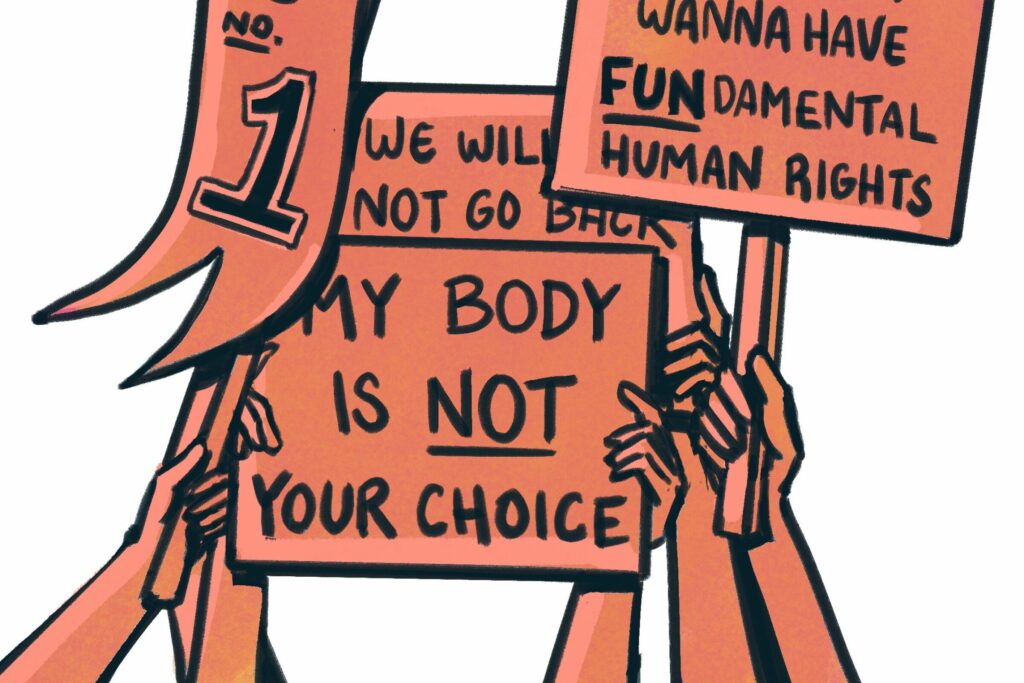
According to the latest reports from ANI, the police team has reached Aftab’s residence in Chattarpur Pahadi, and the investigations are still going on.
Victim blaming sees no end in India
Although there is clear-cut violence done on a woman’s body and there is gender-based violence reported, the public domain is still in hibernation analysing the victim’s morality, choices and lifestyle. There is a huge backlash happening against the murderer, with regard to his religion, and fails to address the gender-based violence happening in India. It also denies justice to the victim and other women, especially if they are from a minority community, like Bilkis Bano who has been in a legal fight for the past few decades.
Also read: ‘What Was She Wearing?’: Rape Culture And The Thriving Narrative Of Victim Shaming
Barsha Chakraborty, Gender Expert from Delhi, in a conversation with FII, says that ‘when it comes to any form of violence against women, we are oscillating between dismissing women’s agency and doubting women’s agency. And even in this case, what we see is absolutely judging the woman’s choice of partner she chose because of religion, then how her parents did not accept her relationship and how she came out of the house and started living with a partner in a live-in relationship. And all these decisions that she took were questioned at this point of time because a crime happened and the crime is being justified by all these. And, here also, when you look at the Love Jihad issue, it’s basically dismissing women’s agency. It’s as if the woman had no choice or woman had no stake in the relationship. And it was like she was brainwashed in some other direction. So, yeah, unfortunately, it’s so difficult to fight certain battles to make people believe that yes, the onus is not on women, the onus is on the person who was the perpetrator who committed the crime.’
At a time when the state is targeting its minorities, this murder case has lit up Islamophobia in the country. The intensity of this issue and how it is to be analysed is of utmost relevance when it comes to gender-based violence and abuse. For the past few days, this has not been happening and there still remains conversations and discussions on how being a Sanskari woman in India helps you to escape the toxic relationship, rape and violence.
About the author(s)
Rohini did her Masters in English from Jamia Millia Islamia, New Delhi. Beyond her passion for music, she writes about performing arts in socio-cultural contexts. An ardent fan of Sylvia Plath and Kamala Suraiyya, she believes poetry has the power to heal.
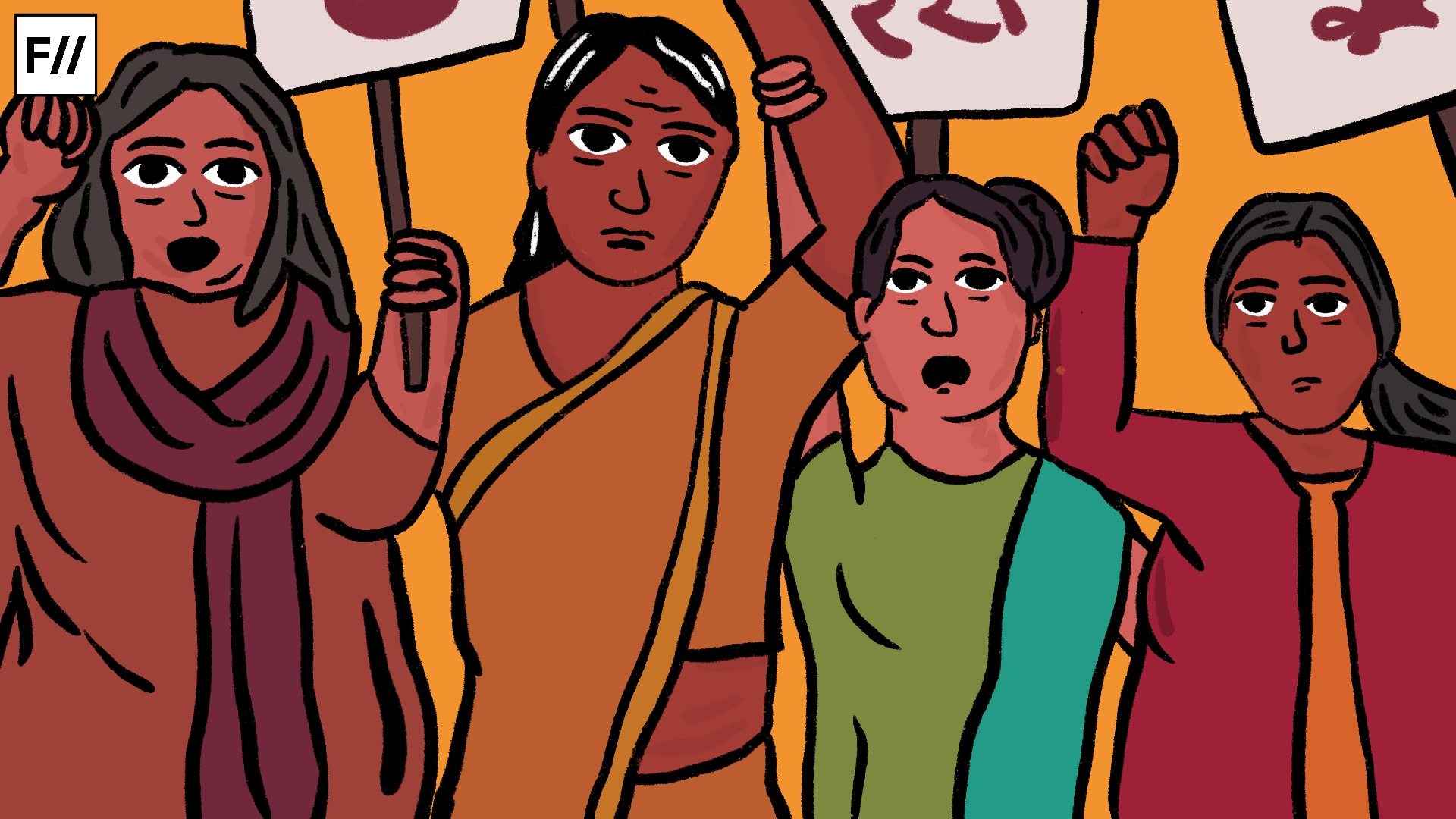


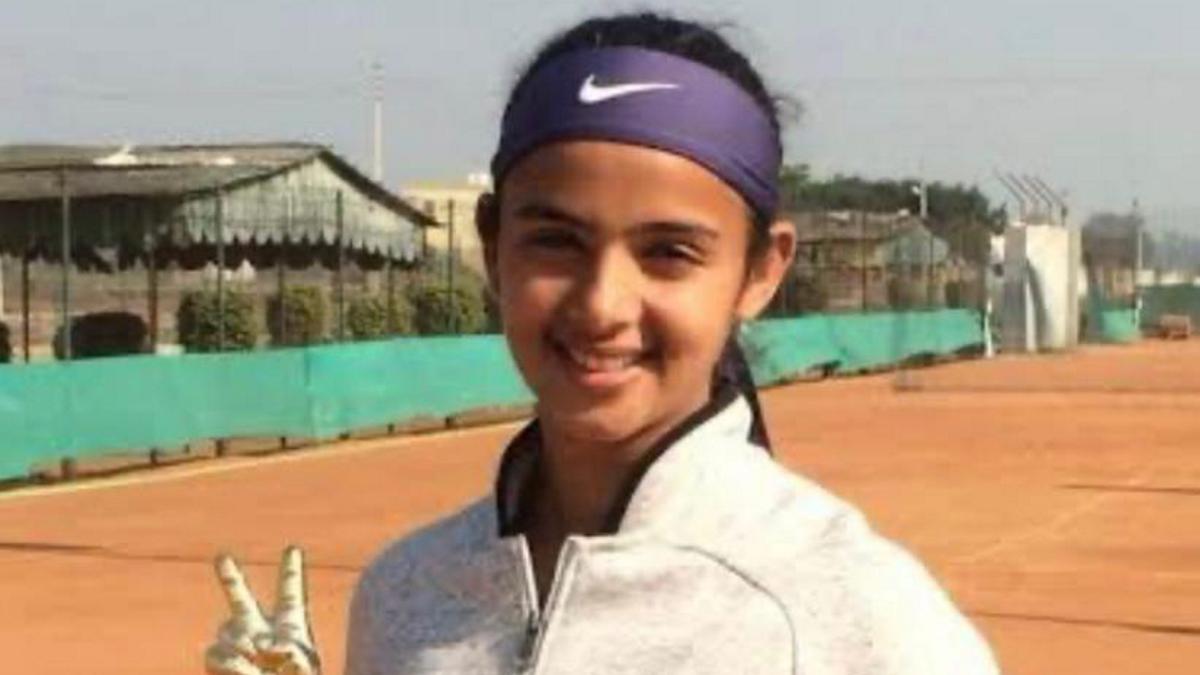

Love jihad happen. You can’t say this is right wing islamophobia. Change your Koran doctrine of prohibition of marring non Muslim. Muslim guys lure Hindu girl by saying there is no conversion but when the girl ask for marriage the boy force her to convert. If they don’t agree the guy kill her.
Preeti Sharma murdering Firoz did not make headlines because it would not generate sensation as the murderer is a woman. So many men are murdered by their wives, especially with the help of paramours, but we don’t get to hear about all those cases. Neither do we get to know about all the suicides of men courtesy of false cases of dowry and rape.
Well thought out and handled with care. The impulsive nature and emotional immaturity esp that is common among lovers is the chief reason. The rest are subject to people and media